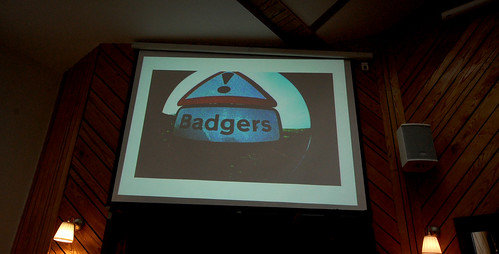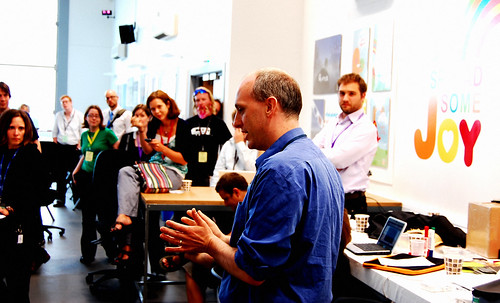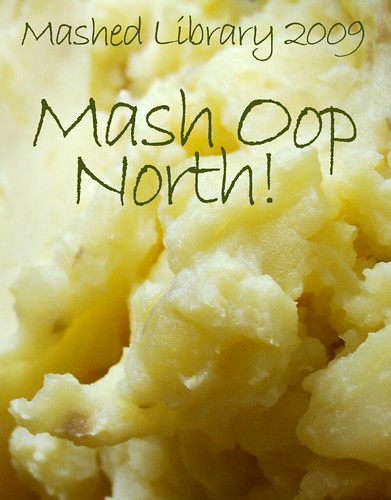The booking form for the next Mashed Library event — MashSpa (aka “Mash and Mashibility”) in Bath on 29th October — is now live!
Event site: http://blogs.ukoln.ac.uk/mashspa/
Booking form: https://library.hud.ac.uk/mashspa/

Category: Mashed Library UK
Mashed Library 2010 – Chips and Mash
I promise that one of these days I’ll get back into regular blogging (honest!)

After “Liver and Mash” at Liverpool, it looked likely that there might not be another Mashed Library event in 2010. So, after a bit of a natter with colleagues, we’ve decided to host another event at Huddersfield (with even more cake than last time!)…
Chips and Mash
- When? Friday 30th July (10am to 4pm)
- Where? University of Huddersfield, West Yorkshire, HD1 3DH
- Event blog http://chipsandmash.wordpress.com/
- Registration form https://library.hud.ac.uk/chipsandmash/
- Cost absolutely free!
- Sponsor Intellident Ltd
Mashed Library 2010 – Liverpool
As announed on Twitter last night, the first Mashed Library UK event of 2010 will be taking place in Liverpool on Friday 14th May 🙂
Keep an eye on the following sites for further details!

It’s become a little tradition to give each event a fun name — we’ve had “Mash Oop North!” (Huddersfield) and “Middlemash” (Birmingham). If you’ve got any suggestions for the Liverpool event, please tweet them to @m8nd1 or @daviddclay, or leave a comment here 🙂
Some (Beatles related) suggestions are:
- A Hard Day’s Mash
- All You Need is Mash
- Sgt Masher’s Mashtastical Mashup Band
- All Things Must Mash
- Mash Me Do
- Eight Mashups a Week
- I Am the Mashup
- Mashups (That’s What I Want)
- I’m API Just to Dance With You
Mashed Library 2009 — Middlemash
Just a quick “heads-up” that the second Mashed Library event of 2009 (“Middlemash”) takes place at Birmingham City University on Monday 30th November.
The registration form should be going live The registration form went live on Tuesday morning and I’m sure it’ll be another sell-out event — keep a close eye on the event blog for further details 🙂

If you can’t make it to Birmingham in November, then keep an eye on the Mashed Library Wiki for details of the next event, which will hopefully take place at the University of Liverpool in early 2010. Many thanks to David Clay for offering to host the event!
Mashed Oop Multimedia
Just in case it’s of interest to anyone, we’ve started uploading videos of the opening sessions from “Mash Oop North” to Vimeo and the Internet Archive (see this blog post for links).
With the free Vimeo account, you can only upload up to 500MB a week, so it’s going to take a few weeks to get them all uploaded. However, you can find them all already on the Internet Archive.
As a taster, here’s Brendan Dawes (Creative Director at Magnetic North) strutting his funky stuff…
Mash Oop North – Brendan Dawes from Dave Pattern on Vimeo.
There’s also quite a few photos on Flickr (tagged with mashlib09)…




Keeping everyone happy at a conference
At Mashed Library UK 2009, we’re planning to kick the event off with six 30 minute opening sessions. We’ve got two rooms, so there’ll be a session running in each room at the same time. Since a delegate can’t be in two places at the same time, they’ll only be able to go to three of the six sessions. So, how do you ensure that you keep everyone happy and that you don’t have too many clashes (i.e. having to miss a session you’d have quite liked to have gone to)?
Having never organised an event before, I’m guessing the usual way would be to try and schedule sessions together that target different audiences? However, that sounds like a potential headache inducer and I’m a programmer, not a planner!
So, what we’re going to do, once we’ve got all six sessions finalised, is to let each of the 60 odd delegates (and by that I mean we’ve got more than 60 delegates!) rank the sessions in order of preference. So, their 1st, 2nd, and 3rd choices would be the three sessions that they’d most like to go to.
With that kind of data, you’d expect to see some clustering (i.e. delegates making the same or similar choices) and so (in theory) there will be an optimal sequencing of sessions that will give the most delegates the best chance to going to their three top choices.
There’s a wide variety of programming techniques for finding optimal solutions to problems, from the simple to the complex (e.g. simulated annealing and genetic algorithms). However, because I’d got a bath running, I decided to knock up a quick hack using the simplest method — randomly generate a session sequence and then see how well it meets the choices of the delegates. By the way, if you want to learn more about calculating optimal solutions, see “Programming Collective Intelligence” by Toby Segaran (ISBN 9780596529321).
With any optimal solution code, you need to way of measuring the success of a given solution. To my mind, that would be “happiness” — if you find a solution that gives a delegate the ability to attend their top three choices, they’ll be very happy, but if you have a session clash for their 1st and 2nd choices, they won’t be happy. Once you’ve calculated the overall “happiness” for all the delegates, then that allows you to compare that particular solution with other random solutions (i.e. “does this session sequence generate more happiness or less that the previous one?”)
I hadn’t planned on releasing the code, as it really was a 5 minute “quick and dirty” hack, but Ben tweeted to say he might find it useful, so I’ve uploaded the Perl script to here. I’ve also included a sample file containing some dummy delegate choices.
For each delegate, there’s a comma separated list showing their session preference (1=top choice)…
Andy 2,4,3,5,6,1
…so Andy’s top choice is session 6, followed by session 1, then session 3, etc.
If you run the Perl script, it’ll pick a random session sequence and calculate the happiness. It’ll keep on looping and trying to find better solutions until it finds one that can’t be improved upon. You’d probably want to run the code several times to ensure that the final solution really is the best one. You might want to also try one of the alternative $overall calculations to see if that produces the same session sequence.
Here’s an example of an early solution…
[1] session 1 = 11 delegate(s)
[1] session 6 = 4 delegate(s)
[2] session 5 = 6 delegate(s)
[2] session 4 = 9 delegate(s)
[3] session 2 = 8 delegate(s)
[3] session 3 = 7 delegate(s)
HAPPINESS = 87 (5.8)
1 Andy -4.8
3 Beth -2.8
3 Cary -2.8
9 Dave +3.2
5 Earl -0.8
9 Fred +3.2
9 Gene +3.2
3 Hans -2.8
9 Iggy +3.2
5 Jane -0.8
5 Karl -0.8
9 Leah +3.2
9 Macy +3.2
3 Neil -2.8
5 Owen -0.8
CLASHES = 7 / OVERALL = 12.4285714285714 / DIFF = 38.4
In the above output, it’s proposing to run sessions 1 & 6 together, then 5 & 4, and finally 2 & 3. By looking at the delegate choices, you can easily calculate which of the two concurrent sessions each delegate would prefer to go to (i.e. 11 delegates would choose to go to session 1).
The code also calculates a “happiness” value for each delegate. If a delegate gets to go to their 1st, 2nd and 3rd choices, then they’d get a maximum happiness score of 9 (3 x 3 points). If a 1st choice session is being run at the same time as their 2nd choice (or a 2nd at the same time as the 3rd), that would make them unhappy, so a point is deducted. If a 1st choice runs at the same time as their 3rd choice, they’d probably accept that (however, nothing is added to their happiness score).
Once all the scores have been calculated, we get an overall happiness of 87 (out of a possible 135, i.e. 15 delegates x the maximum happiness score of 9) and the average happiness is 5.8 out of 9.
We can also see the how (un)happy each delegate is and how much they deviate from the average happiness. Dave, Fred, Gene, Iggy, Leah and Macy all get to go to their top 3 choices, so they’ve all got scores of 9 out of 9. Andy is very unhappy (1 out of 9). The others are somewhere in the middle, so they’ve all had to make compromises and won’t be going to their top 3 sessions.
There are 7 clashes (when a 1st choice runs at the same time as the 2nd, or the 2nd at the same time as the 3rd). Ideally, we’d like to keep the clashes to a minimum.
Here’s an example of a better solution (which might actually be the optimal solution for the dummy data)…
[1] session 3 = 9 delegate(s)
[1] session 5 = 6 delegate(s)
[2] session 4 = 9 delegate(s)
[2] session 6 = 6 delegate(s)
[3] session 1 = 10 delegate(s)
[3] session 2 = 5 delegate(s)
HAPPINESS = 101 (6.73333333333333)
5 Andy -1.73333333333333
9 Beth +2.26666666666667
3 Cary -3.73333333333333
3 Dave -3.73333333333333
5 Earl -1.73333333333333
3 Fred -3.73333333333333
5 Gene -1.73333333333333
9 Hans +2.26666666666667
5 Iggy -1.73333333333333
9 Jane +2.26666666666667
9 Karl +2.26666666666667
9 Leah +2.26666666666667
9 Macy +2.26666666666667
9 Neil +2.26666666666667
9 Owen +2.26666666666667
CLASHES = 2 / OVERALL = 50.5 / DIFF = 36.2666666666667
The average happiness is now up to 6.73 per delegate and there are only 2 clashes, which is much better. Cary, Dave and Fred will be the most affected by this particular session scheduling, but we now have 8 delegates attending their top choices.
So, the big question will be: what happens when we get the real data from the 60 odd delegates who are coming to Mashed Library? Stay tuned for the answer!
Mashed Library UK 2009 — Open for Business!
We’re now accepting registrations for Mashed Library UK 2009: Mash Oop North!

Please see the event blog for further details.
————
Blimey — we’ve “sold out” already! Any bookings from 2:20pm onwards today will be placed on a waiting list.
Mashed Library UK 2009 – Mash Oop North!
The date for your diary is Tuesday 7th July 2009 and the event will take place in a large studio space in the Creative Arts Building at the University of Huddersfield. The online registration form should appear before the end of April.
If you want to keep up-to-date with the event, then make sure you join the mashedlibrary group on ning.com. You can also subscribe to the RSS feed from the event blog and the Twitter hash is #mashlib09.
The planning for the event is very much a group effort with seven of us having semi-regular meetings in pubs: Zoë, Lisa, Bryony, Tanya, Iman, Graham and myself. Although there’s still plenty of logistical stuff to figure out, it feels like the event is coming together nicely and hopefully we’ve managed to incorporate most of the feedback and suggestions from the first event.
The event will mostly be an unconference and we’re aiming to create an environment that will encourage networking, creativity and fun. Ideally, we’d like to attract a good mix of developers and tech-savvy librarians, and we think we can probably fit around 50 people into the studio.
The plan is to kick off with a couple of structured sessions, which will include an introduction to using Yahoo Pipes for those of you who’ve never played with mashups before (courtesy of the one-and-only Tony Hirst). At the same time, there’ll be a more techie session for the developers.
After those sessions, we’ll move to a more informal unconference style event. You’ll be encouraged to network, to get creative with the various available data sources, to brainstorm new ideas and to come up with prototypes.
If you’re a librarian with ideas, then Mashed Library is a fantastic opportunity to meet with techies who can turn those ideas into working prototypes and services. And, if you’re a techie, this is a chance to brainstorm with librarians and write code that’ll provide cool new services to library users!
We’d also like to encourage student librarians (and any other students who love libraries) to come to the event. We’ll shortly be announcing how you can apply for sponsorship to attend for free and to have your travel costs covered.
Speaking of sponsorship, we’d like to thank Talis for stepping up to be the main sponsors of the event. Talis have a long history of helping sponsor developer events (e.g. Code4Lib 2009) and they’ll be ensuring you don’t faint from lack of nourishment during the day!
We also like to attract sponsorship for prizes. If you’re an organisation who can make data available for the event, we’d love you to sponsor a prize for the best use of your data on the day (please get in touch with me if you’d like to discuss this)
Throughout the day we’ll be running short 5 minute “lightning talks”. Who’ll be giving those talks? You will, of course! The talks will be your chance to pitch an idea, show off something you’ve done, talk about your favourite web site/service, or to just rant for a few minutes. The talks will be optional, but we’re sure they’ll be something of interest to everyone.
Mash Oop North
Coming this summer…

We’re hoping to fix the date soon, but it’s likely to be on or around Tuesday July 7th at the University of Huddersfield.
If it is July 7th, then we’d be able to celebrate:
…that both events occurred on July 7th is not a coincidence 😉
(mashed potato courtesy of jslander)
Mashed Libraries — “Mash Oop North”?
I’ll try and make some time to blog about the excellent dev8D event, but on Thursday morning I had a chat with Owen Stephens about running a Mashed Libraries event in Yorkshire.
Earlier on in the week, the name “Mash Oop North” sprang into my head[1]. With a name like that, it’d be rude not to run an event 😀

(Mash and Gravy by chotda)
So, would anyone be interested in attending an event hosted in Huddersfield (or perhaps somewhere else in Yorkshire)? I’ve posted a comment on the Mashed Libraries forum with more details about travel links to Huddersfield. Please post a comment here or on the forum to say “yay” or “nay”!
[1] “oop north” is fairly common slang for “up north” (i.e. the North of England), as in “it’s grim oop north“